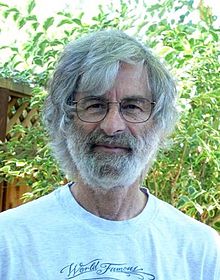Leslie Lamport
Leslie Lamport | |
|---|---|
 | |
| Born | February 7, 1941 New York City, U.S. |
| Alma mater | |
| Known for | |
| Awards |
|
| Scientific career | |
| Fields | Computer science |
| Institutions | |
| Thesis | The analytic Cauchy problem with singular data (1972) |
| Doctoral advisor | Richard Palais[1] |
| Website | lamport |
Leslie B. Lamport (born February 7, 1941) is an American
Lamport was the winner of the 2013
Early life and education
Lamport was born into a Jewish family in Brooklyn, New York, the son of Benjamin and Hannah Lamport (née Lasser).[citation needed] His father was an immigrant from Volkovisk in the Russian Empire (now Vawkavysk, Belarus)[9] and his mother was an immigrant from the Austro-Hungarian Empire, now southeastern Poland.
A graduate of Bronx High School of Science, Lamport received a B.S. in mathematics from the Massachusetts Institute of Technology in 1960, followed by M.A. (1963) and Ph.D. (1972) degrees in mathematics from Brandeis University.[10] His dissertation, The analytic Cauchy problem with singular data, is about singularities in analytic partial differential equations.[11]
Career and research
Lamport worked as a computer scientist at Massachusetts Computer Associates from 1970 to 1977, Stanford Research Institute (SRI International) from 1977 to 1985, and Digital Equipment Corporation and Compaq from 1985 to 2001. In 2001 he joined Microsoft Research in California.[10]
Distributed systems
Lamport's research contributions have laid the foundations of the theory of distributed systems. Among his most notable papers are
- "Time, Clocks, and the Ordering of Events in a Distributed System",Principles of Distributed Computing (PODC) Influential Paper Award in 2000,[12]
- "How to Make a Multiprocessor Computer That Correctly Executes Multiprocess Programs",[13] which defined the notion of sequential consistency,
- "The Byzantine Generals' Problem",[14]
- "Distributed Snapshots: Determining Global States of a Distributed System"[15] and
- "The Part-Time Parliament".[16]
These papers relate to such concepts as
- the Paxos algorithm for consensus,
- the bakery algorithm for mutual exclusion of multiple threads in a computer system that require the same resources at the same time,
- the Chandy–Lamport algorithm for the determination of consistent global states (snapshot), and
- the Lamport signature, one of the prototypes of the digital signature.
LaTeX
When Donald Knuth began issuing the early releases of TeX in the early 1980s, Lamport — due to his personal need of writing a book — also began working on a set of macros based on it, hoping that it would later become its standard macro package. This set of macros would later become known as LaTeX, for which Lamport would subsequently be approached in 1983 by Peter Gordon, an Addison-Wesley editor, who proposed that Lamport turn its user manual into a book.[18][19]
In September 1984, Lamport released version 2.06a of the LaTeX macros, and in August 1985, LaTeX 2.09 — the last version of Lamport's LaTeX — would be released as well. Meanwhile, Addison-Wesley released Lamport's first LaTeX user manual, LaTeX: A Document Preparation System, in 1986, which purportedly sold "more than a few hundred thousands" copies, and on August 21, 1989, at a TeX User Group meeting at Stanford, Lamport would agree to turn over the maintenance and development of LaTeX to Frank Mittelbach, who, along with Chris Rowley and Rainer Schöpf, would form the LaTeX3 team, subsequently releasing LaTeX 2e, the current version of LaTeX, in 1994.[19][20]
Temporal logic
Lamport is also known for his work on temporal logic, where he introduced the temporal logic of actions (TLA).[21][22] Among his more recent contributions is TLA+, a language for specifying and reasoning about concurrent and reactive systems, which he describes in the book Specifying Systems: The TLA+ Language and Tools for Hardware and Software Engineers.[23] He defines TLA+ as a "quixotic attempt to overcome engineers' antipathy towards mathematics".[24]
Awards and honors
Lamport received the 2013
References
- ^ Leslie Lamport at the Mathematics Genealogy Project
- ISBN 978-0-201-15790-1. Retrieved 2019-06-20.
- ^ Lamport, Leslie (2013). "Leslie Lamport - A.M. Turing Award Winner". ACM.
- ^ Leslie Lamport author profile page at the ACM Digital Library
- ^ S2CID 215822405.
- Microsoft Academic
- S2CID 5936915.
- S2CID 31514650.
- ^ "World War I draft card for Benjamin Lamport". Ancestry.com. Retrieved 12 July 2022.
- ^ a b c Lamport, Leslie (2006-12-19). "My Writings". Retrieved 2007-02-02.
- ^ Lamport, Leslie (1972). "The Analytic Cauchy Problem with Singular Data". Retrieved 2007-02-02.
- ^ Neiger, Gil (2003-01-23). "PODC Influential Paper Award: 2000". Archived from the original on 2013-09-12. Retrieved 2007-02-02.
- S2CID 5679366.
- S2CID 55899582. Retrieved 2007-02-02.
- S2CID 207193167. Retrieved 2007-02-02.
- S2CID 421028. Retrieved 2007-02-02.
- ^ "Most cited articles in Computer Science". September 2006. Retrieved 2007-10-08.
- ^ Lamport, Leslie. "How (LA)TEX changed the face of Mathematics" (PDF).
- ^ a b "The Writings of Leslie Lamport". lamport.azurewebsites.net. Retrieved 2019-07-19.
- ^ "TeX, LaTeX, and AMS-LaTeX". 1998-12-03. Archived from the original on 1998-12-03. Retrieved 2019-07-19.
- ^ Lamport, Leslie (1990-04-01). "A Temporal Logic of Actions". Retrieved 2007-02-02.
- S2CID 5498471. Retrieved 2007-02-02.
- ISBN 978-0-321-14306-8. Retrieved 2007-02-02.
- ^ "The International Conference on Dependable Systems and Networks keynote speaker biography". Archived from the original on 2019-02-12. Retrieved 2021-07-05.
- ^ "Turing award 2013". ACM.
- ^ Leslie Lamport ACM Fellows 2014
- ^ "IEEE Emanuel R. Piore Award Recipients es" (PDF). IEEE. Archived from the original (PDF) on 2010-11-24. Retrieved 2010-12-31.
- S2CID 6429068. Retrieved 2007-02-02.
- ^ "Edsger W. Dijkstra Prize in Distributed Computing: 2005". Retrieved 2007-02-02.
- ^ "PODC 2001: Lamport Lecture Series". Retrieved 2009-07-02.
- ^ "IEEE John von Neumann Medal Recipients" (PDF). IEEE. Retrieved December 31, 2010.
- ^ Members and Foreign Associates Elected Archived May 7, 2011, at the Wayback Machine, National Academy of Sciences, May 3, 2011.
External links
 Quotations related to Leslie Lamport at Wikiquote
Quotations related to Leslie Lamport at Wikiquote
